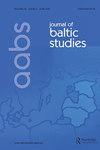East Prussian Sinti and/as German expellees: beyond mémoires croisées
IF 0.5
4区 社会学
Q2 AREA STUDIES
引用次数: 1
Abstract
ABSTRACT Romani victims of Nazi persecution and German expellees developed as distinct memory communities after 1945, but the pre-war integration of Sinti and gadje in East Prussia has left traces in their memory texts. Non-Romani texts and photos contain rare evidence for aspects of Sinti life before the genocide, much of it now available (only) on the internet. Conversely, Sinti were among the Germans who were forced to leave East Prussia after 1944, and awareness of dual trauma and nostalgia for the Heimat they shared with other Germans is apparent in their memory texts. The article explores these points of contact between the two memory communities and their implications for more solidary forms of remembering and re-visioning the region’s multiethnic past.东普鲁士辛提人和/作为德国被驱逐者:超越msammoires croissames
1945年后,纳粹迫害的罗姆受害者和被德国驱逐的罗姆人形成了截然不同的记忆社区,但战前东普鲁士Sinti和gadje的融合在他们的记忆文本中留下了痕迹。非罗姆文字和照片包含了种族灭绝前辛提人生活方面的罕见证据,其中大部分现在只能在互联网上找到。相反,辛提人是1944年后被迫离开东普鲁士的德国人之一,在他们的记忆文本中,他们明显意识到与其他德国人共享的双重创伤和对海玛特的怀念。本文探讨了两个记忆社区之间的这些接触点,以及它们对更团结的记忆形式和重新设想该地区多民族过去的影响。
本文章由计算机程序翻译,如有差异,请以英文原文为准。
求助全文
约1分钟内获得全文
求助全文
来源期刊

Journal of Baltic Studies
AREA STUDIES-
CiteScore
1.20
自引率
0.00%
发文量
52
期刊介绍:
The Journal of Baltic Studies, the official journal of the Association for the Advancement of Baltic Studies (AABS), is a peer-reviewed, multidisciplinary journal for the purpose of advancing the accumulation of knowledge about all aspects of the Baltic Sea region"s political, social, economic, and cultural life, past and present. Preference is given to original contributions that are of general scholarly interest. The Association for the Advancement of Baltic Studies is an international, educational, and scholarly non-profit organization. Established in 1968, the purpose of the Association is the promotion of research and education in Baltic Studies.
 求助内容:
求助内容: 应助结果提醒方式:
应助结果提醒方式:


